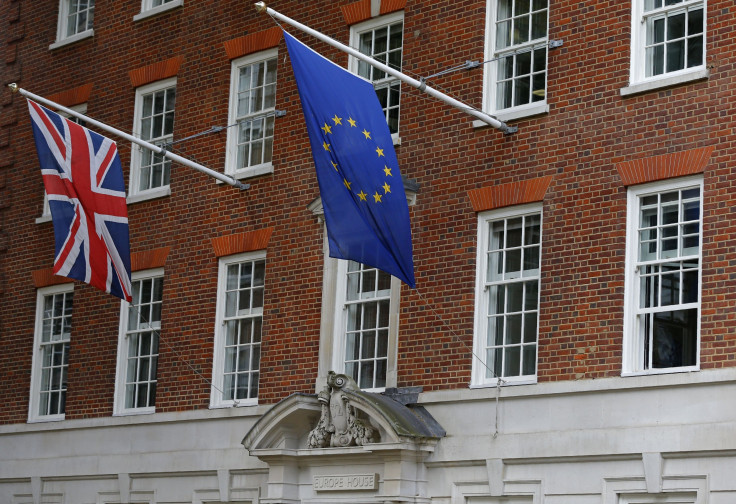Brexit Discussions To Dominate EU Summit As Leaders Call For A Quick Exit

UPDATE: 6:30 a.m. EDT — The European Commission’s President Jean-Claude Juncker asked the United Kingdom to “clarify its position” on Brexit soon “so we can get on with it.”
In an emotional address to the European parliament, Juncker reportedly insisted that there must be no secret negotiations on Brexit. Juncker even addressed the U.K. Independence Party’s leader Nigel Farage, saying: “You were fighting for the exit. The British people voted in favor of the exit, why are you here?”
Manfred Weber, a close ally of the German chancellor Angela Merkel, also accused Farage of lying about transferring the 350 million pounds (about $470 million) to the U.K.’s National Health Services.“Shame on you,” he said as MEPs backed him with a round of applause.
Meanwhile, Merkel addressed the Bundestag in Berlin where she declared that the U.K. will not be treated to any special favors.
“We will make sure that negotiations will not be carried out as a cherry-picking exercise,” Merkel said. “There must be and there will be a palpable difference between those countries who want to be members of the European family and those who don’t.”
Original story:
Tuesday’s European Union summit will put on hold discussions on issues like terrorism, migration and the EU's external relations to discuss the elephant in the room, Brexit.
EU delegates will be meeting for the first time after last week’s referendum in the United Kingdom in which Britain voted to leave the union. U.K.’s Prime Minister David Cameron will be present at the summit, and is expected to explain the U.K.’s position at a dinner. However, Cameron will leave after the dinner and take no part in the talks between leaders of the bloc’s 27 remaining members on Wednesday.
Europe’s leaders are divided over how to negotiate Brexit and reports say that the U.K. is apparently reluctant to initiate formal talks on leaving. An EU source told The Guardian that lawyers had concluded that a member state could not be forced to launch the process.
The source predicts that the EU may refuse to hold informal talks with the U.K regarding Brexit till the country officially triggers Article 50 of the Lisbon Treaty, the procedure that governs how a member state leaves the bloc. There are two ways it can be triggered. The first is by the head of the country in question sending a formal letter to the President of the European Council, and the second by formally stating so during a Council session.
EU Parliament President Martin Schulz reportedly wants Cameron to trigger article 50 at Tuesday’s Summit. “We expect the British government to deliver now,” Schulz told Germany’s Bild am Sonntag newspaper. “The summit on Tuesday is the appropriate moment to do so.”
EU Commission President Jean-Claude Juncker is also in favor of a quick Brexit. He reportedly called Cameron Friday, asking him to trigger article 50 immediately.
But, Brussels’ attempts in getting a quick Brexit is probably of no use. Cameron, who announced his resignation on Friday after the referendum results, said in his resignation speech that his successor will decide how the U.K. will proceed after its EU referendum. He added that his successor, who will be elected by the start of September, will also decide when to give a formal notification of the U.K.'s intention to leave by triggering article 50.
Meanwhile, German Chancellor Angela Merkel said that the new U.K. government must be given time to prepare itself. However, she is in favor of a quick Brexit saying that the process cannot be delayed indefinitely amid fears of “contagion” for an organization, which is already facing multiple economic and political challenges. French President Francois Hollande also stressed on the need to process the U.K.’s exit as quickly as possible and focus on other issues such as fighting terrorism and strengthening the borders.
Italian Prime Minister Matteo Renzi called Brexit a “great opportunity” for Europe. “More growth and more investment, less austerity and less bureaucracy, this is the line we have proposed for two years, at the beginning in isolation,” Renzi said.
Dutch Foreign Minister Bert Koenders reportedly said on Sunday, “We can’t have the kind of dithering Boris Johnson is suggesting. Everyone wants clarity: people, businesses, financial markets.”
But, Finland’s ex-Prime Minister Alexander Stubb advised the EU not to push Britain too fast into invoking article 50. “This will be an extremely complicated set of negotiations,” he said.
Officials said that the U.K. will not be able to conclude a trade deal with the EU until it has left the union. European Council’s President Donald Tusk even appointed Didier Seeuws to lead a “Brexit taskforce” of EU negotiators. Seeuws was formerly the chief of staff to Tusk’s predecessor Herman Van Rompuy.
The European Union would try to show a united front during the summit considering many countries are toying with the idea of holding similar referendums.
Schulz had earlier rejected the idea that the Brexit will trigger a domino effect across Europe. “We respect the way Great Britain has decided to go,” Schulz said. “David Cameron has put a great responsibility on his shoulders. We now have to negotiate seriously with Great Britain. It will be treated as a ‘third country’.”
Leaders from the EU’s member nations, excluding Cameron, will meet informally on Wednesday to discuss the political and practical implications of Brexit and start a discussion on the future of the politico-economic union with 27 member states.
© Copyright IBTimes 2024. All rights reserved.






















